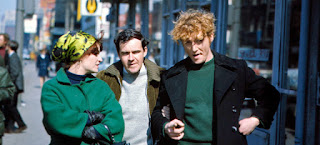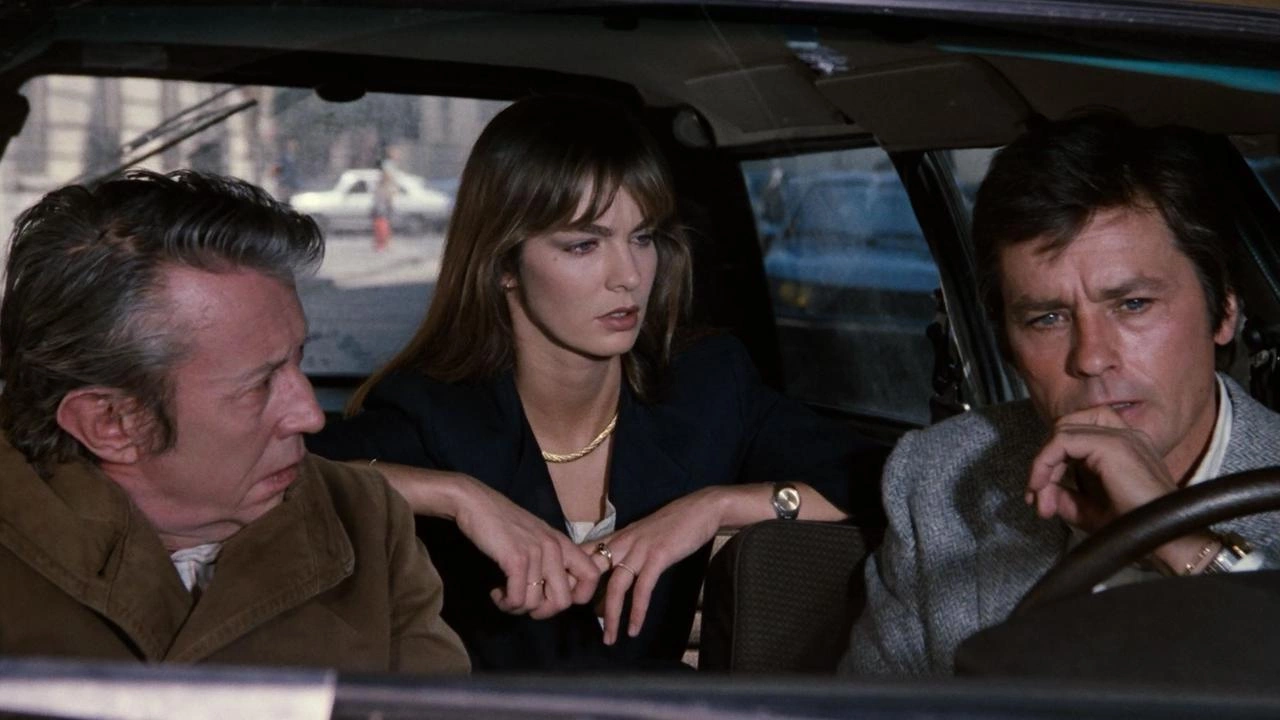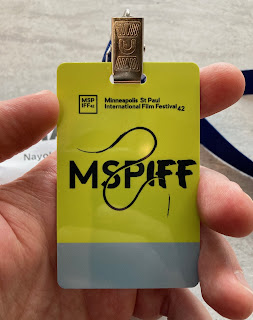I wish I could tell you I'm cool. I've been a fan of Martin Scorsese ever since I knew you could be a fan of directors and I wish I could tell you that in addition to the crime epics I watched dozens if not hundreds of times as a teenager I loved the more idiosyncratic entries to Scorsese's filmography just as well. As a young movie fan I focused very squarely on the violent, operatic Scorsese and either failed to appreciate his other work or skipped it altogether. It wasn't until a few years ago that I finally caught up to After Hours and to be brutally honest: it didn't land cleanly for me. I could appreciate the strangeness of Paul Hackett's (Griffin Dunne) nightmare odyssey into the wee hours of Soho, but I think my overall expectations for the film didn't match the reality of it. I thought it would be more immediately hilarious, more madcap, and more propulsive. I also struggled to relate to the protagonist. I didn't much care for the meek yet entitled word processor and I felt somewhat indifferent towards his torment. I empathized more with Robert Plunket's character who after enduring a long and wild-eyed explanation of Paul's horrible night asks him rather succinctly, "Why don't you just go home?"
Still, something about After Hours wedged itself firmly in my imagination where it continued to ferment and I knew it would be something I'd one day revisit. My obsession with cinematic New York City meant that I was continually seeing references to After Hours in books and articles or hearing it mentioned in discussions that interested me. I'm also a tremendous fan of other movies produced by Dunne and Amy Robinson: Joan Micklin Silver's Chilly Scenes of Winter has been a longtime favorite of mine and more recently I caught up to Sydney Lumet's Running on Empty which I adored. I've also been at this movie-watching game long enough to know that a second look (or a third) is sometimes what you need to make sense of a film on its own terms instead of whatever expectations you're bringing to the experience. So when I heard that Criterion was releasing After Hours I committed to snagging a copy and returning to it. I'm so glad I did.
I'm admittedly a fan of stylists and After Hours was never wanting in that department. It opens with frantic, ranging camera movements conveying a sense of restlessness in probably the most mundane location possible: an office floor packed with corporate drones. Upon my second watch, I couldn't help but note that the opening is one of the few scenes permitted to have sunlight in it. Scorsese was looking to keep his production schedule lean but in no way does that impede the mobility of his camera. After Hours would be the first of several Scorsese collaborations with cinematographer Michael Ballhaus who had a talent for shooting beautiful pictures efficiently - initially forged in Fassbinder's creative maelstrom and having previously lensed the luminous Heartbreakers. The color palette is generally muted; beige, gray, and blue; shrouded in darkness with only the occasional stab of streetlight or neon to penetrate it. Scorsese insisted that (nearly) the entire film, including the interior sequences, be shot at night. Nighttime permeates every frame and that wandering camera gives the impression of peering closer to get a better look. Paul himself is always examining his surroundings and After Hours is crammed with cryptic details that may or may not signify anything: a screaming sculpture, prescription labels, a skull keychain, a medical text, or graffiti of a shark eating a man's penis. The austere Soho location work gives After Hours a foundation of inscrutable alienness (at least as Paul sees it) but the production design and art direction make it visceral. Howard Shore's ethereal, metronomic score perfectly complements the vacant streetscape. I think of Scorsese as a soundtrack guy. He utilizes both classical and pop references with equal facility and to be certain some of that makes its way to After Hours. However, it's all bound together by this exquisitely desolate, haunting pulse from Cronenberg's go-to composer.
Despite any initial impressions I had towards Griffin Dunne's character, the quality of After Hours' ensemble was undeniable from first viewing. Rosanna Arquette, Linda Fiorentino, Terri Garr, John Heard, Catherine O'Hara, Verna Bloom, Cheech & Chong, even Dick Miller. It's such a fantastic collection of talent that was active at the time and a testament to the interconnectedness of their previous projects. Whether they get an extended sequence like the pop explosion 60s time capsule of Garr's apartment or the brief nod Miller has when he recites the film's title line, you get the sense of a living, breathing late night denizen with a story to tell. I can't deny Dunne's performance and we stay with him in every scene from the muted to the brazen. His increasing level of mania is palpable to point where he cries out into the night asking the question familiar to all desperate people, "What have I done to deserve this?" The women own the film for me, though. They all, in some way, reflect film noir tropes by inviting Paul into situations that eventually turn sour on him. However, this quasi-seduction isn't any kind of reflection on their amorality. They're genuinely interesting people, mostly artists and loners looking for connections, and Paul's undoing is largely through his own desire to be with them without understanding their world. The crux of the narrative is that he traveled somewhere far from home, late at night, because he has a brief conversation with a beautiful girl. Some of the early audience feedback for After Hours was that it expressed a level of misogyny because the women of the film are "all crazy." However, part of the key (this movie is filled with keys and doors) for me to appreciate the film was that it's both being presented from Paul's point of view and that it isn't necessarily an endorsement of that perspective. The women in the film appear crazy to Paul because he misunderstands every situation and person he encounters that night.
Scorsese claims that Paul's dilemma was something he was able to recognize in his own life. Before working on the film, Marty had moved to Tribeca and while he was a native New Yorker he soon realized that he was not part of the downtown art scene at all. It was an alien world to him. So while I don't think Scorsese is asking the audience to validate Paul's actions, he is asking us to empathize with him. As uncomfortable as it might be, I've lived through many times when I've been the outsider stumbling into a situation without understanding the context. Despite my best efforts I've been the idiot tourist who can't make sense of the local scene and I've certainly experienced the record-scratch anxiety of walking into the wrong bar at the wrong time. In Paul's eyes it's an endless Kafka-esque series of persecutions that he's done nothing to deserve, but it's his failure to cultivate an understanding of his surroundings that's truly hounding him. Once I was able to wrap my head around this, I was much more able to access the humor of After Hours and it is incredibly funny. I came into it thinking it would be funny in a zany "one crazy night" farce mode; a Coen brothers comedy of errors. After Hours eventually does reach that heightened pitch, but so many of the funny moments are delivered flatly with brief pause as both you and Paul try to process the last outlandish statement or event. It's also an incredibly dark picture. The satire bites but it's housed in the structure of a stressed out nightmare with a finale worthy of surrealist horror. The drug use in After Hours is minimal but it still has those tangibly sweaty paranoid coke vibes that Scorsese has always captured so well.
While I have come around on my ability to better understand Paul, find the comedy in his tragedy, and even relate pieces of my own life to his - I haven't totally come to terms with him. He's looking for adventure in the city but he isn't willing to pay his dues - whether that's his subway fare or getting a mohawk at Club Berlin. He relates to women in the film in a similar manner, either as objects of desire or sources of shelter, but he's not attempting to truly understand them. It's this sense of entitlement that rankled me on my first watch and it continues to do so. This has only been made more poignant as the once neglected, industrial Soho that was supposed to have an expressway run through the middle of it has become overrun with Pauls. Not artists looking to carve a space for themselves in the world, but word processors (or their modern day equivalents) looking to have a interesting life simply by virtue of being able to afford to live there. Comedian Nato Green described comparable recent arrivals in San Francisco as people who "want big city amenities but aren't willing to deal with big city problems." Maybe I'm more like Paul than I think when I first watched After Hours looking for a breezy good time. So while I'm not cool, I'm glad to have made a return to Scorsese's fever dream Soho. I think I'll keep coming back, but I needed to make an effort to get to know the place.
Enjoyed this post? Never miss out on future posts by following me


































